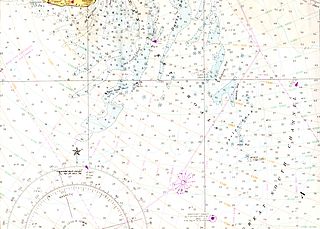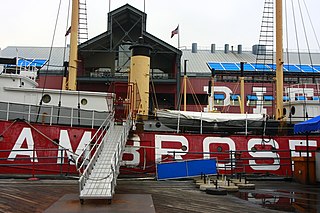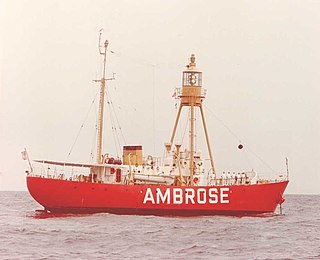Nantucket is an island, town and county in Massachusetts.
Contents
Nantucket may also refer to:
Nantucket is an island, town and county in Massachusetts.
Nantucket may also refer to:
Phoenix most often refers to:

Nantucket is an island about 30 miles (48 km) south from Cape Cod. Together with the small islands of Tuckernuck and Muskeget, it constitutes the Town and County of Nantucket, a combined county/town government in the state of Massachusetts. Nantucket is the southeasternmost town in both Massachusetts and the New England region.
Bush commonly refers to:

A lightvessel, or lightship, is a ship that acts as a lighthouse. They are used in waters that are too deep or otherwise unsuitable for lighthouse construction. Although some records exist of fire beacons being placed on ships in Roman times, the first modern lightvessel was located off the Nore sandbank at the mouth of the River Thames in London, England, and placed there by its inventor Robert Hamblin in 1734. Lightships have become largely obsolete; some being replaced by lighthouses as construction techniques advanced, others by large automated navigation buoys.

Felix A. Pappalardi Jr. was an American music producer, songwriter, vocalist, and bassist. He is best known as the bassist and co-lead vocalist of the band Mountain, whose song "Mississippi Queen" peaked at number 21 on the Billboard Hot 100 and became a classic rock radio staple. Originating in the eclectic music scene in New York's Greenwich Village, he became closely attached to the British power trio Cream, writing, arranging, and producing for their second album Disraeli Gears. As a producer for Atlantic Records, he worked on several projects with guitarist Leslie West; in 1969 their partnership evolved into the band Mountain. The band lasted less than five years, but their work influenced the first generation of heavy metal and hard rock music. Pappalardi continued to work as a producer, session musician, and songwriter until he was shot and killed by his wife Gail Collins in 1983.

Mountain was an American hard rock band formed on Long Island, New York, in 1969. Originally consisting of vocalist-guitarist Leslie West, bassist-vocalist Felix Pappalardi, keyboardist Steve Knight, and drummer N. D. Smart, the group disbanded in 1972, but reunited on several occasions prior to West's death in 2020. They are best-known for their 1970 smash hit song "Mississippi Queen", which remains a staple of classic rock radio, as well as the heavily sampled song "Long Red", and their performance at Woodstock Festival in 1969. Mountain is one of many bands commonly credited with influencing the development of heavy metal music during the 1970s. The group's musical style primarily consisted of hard rock, blues rock, and heavy metal.

Owen Chase was first mate of the whaler Essex, which sank in the Pacific Ocean on November 20, 1820, after being rammed by a sperm whale. Soon after his return to Nantucket, Chase wrote an account of the shipwreck and the attempts of the crew to reach land in small boats. The book, Narrative of the Most Extraordinary and Distressing Shipwreck of the Whale-Ship Essex, was published in 1821 and would inspire Herman Melville to write Moby-Dick.

The station named Nantucket or Nantucket Shoals was served by a number of lightvessels that marked the hazardous Nantucket Shoals south of Nantucket Island. The vessels, given numbers as their "name," had the station name painted on their hulls when assigned to the station. Several ships have been assigned to the Nantucket Shoals lightship station and have been called Nantucket. It was common for a lightship to be reassigned and then have the new station name painted on the hull. The Nantucket station was a significant US lightship station for transatlantic voyages. Established in 1854, the station marked the limits of the dangerous Nantucket Shoals. She was the last lightship seen by vessels departing the United States, as well as the first beacon seen on approach. The position was 40 miles (64 km) southeast of Nantucket Island, the farthest lightship in North America, and experienced clockwise rotary tidal currents.

Lightship Ambrose was the name given to multiple lightships that served as the sentinel beacon marking Ambrose Channel, New York Harbor's main shipping channel.

Laurence Gordon "Corky" Laing is a Canadian rock drummer, best known as a longtime member of the pioneering American hard rock band Mountain. He and guitarist/vocalist Leslie West were the only members to appear on every album.

Nantucket Sleighride is the second studio album by American hard rock band Mountain, released in January 1971 by Windfall Records in the US and by Island in the UK. It reached number 16 on the Billboard Hot 200 Album Chart in 1971.

Live: The Road Goes Ever On is the second live album by American hard rock band Mountain, released on 24 April 1972 by Windfall Records. It contains four songs recorded at three shows in August 1969, December 1971, and January 1972. The album was produced by the band's bassist and second vocalist Felix Pappalardi, while the artwork was created by his wife and collaborator Gail Collins. The Road Goes Ever On takes its name from J. R. R. Tolkien's 1937 novel The Hobbit.

Twin Peaks is the third live album by American hard rock band Mountain, released in February 1974 by Columbia and Windfall Records. It contains recordings from the band's performance at Koseinenkin Hall in Osaka, Japan on August 30, 1973. The album was produced by the band's bassist and second vocalist Felix Pappalardi, while the artwork was created by his wife and collaborator Gail Collins. It was Mountain's first release since returning after a year-long hiatus.

United States lightship Nantucket (LV-112) is a National Historic Landmark lightship that served at the Lightship Nantucket position. She was the last serving lightship and at time of its application as a landmark, one of only two capable of moving under their own power. She served as the lightship for such notable vessels as the liners United States, Queen Mary, and Normandie.

LV-117 was a lightvessel of the United States Lighthouse Service. Launched in 1931, she operated as the Nantucket lightship south of Nantucket Shoals. Moored south of Nantucket Island, Massachusetts, the lightship was at the western part of the transatlantic shipping lane and the first lightship encountered by westbound liners approaching New York Harbor. On May 15, 1934, one of these liners, RMS Olympic, rammed and sank LV-117, killing seven of her crew.
A Nantucket sleighride is the dragging of a whaleboat by a harpooned whale while whaling. It is an archaic term from the early days of open-boat whaling, when the animals were harpooned from small open boats. Once harpooned, the whale, in pain from its wound, attempts to flee, but the rope attached to the harpoon drags the whalers' boat along with it. The term refers to Nantucket, Massachusetts, the center of the American whaling industry; as well as the speed associated with riding in a horse-drawn sleigh. The term wasn't used by whalemen themselves, but was probably invented by a late 19th-century journalist.

Mystic Fire is the seventh studio album by American hard rock band Mountain, released in 2002. It is their final album of original material, as their following album, Masters of War, would consist solely of covers.

The United States Lightship WLV-613 was a lightvessel commissioned in 1952 that became the last lightship to mark the Ambrose Channel. She was replaced by a Texas Tower lightstation on 24 August 1967.

The Nantucket Lightship or United States Lightship WLV-612 is a lightvessel commissioned in 1950 that became the last lightship decommissioned in United States Coast Guard service.